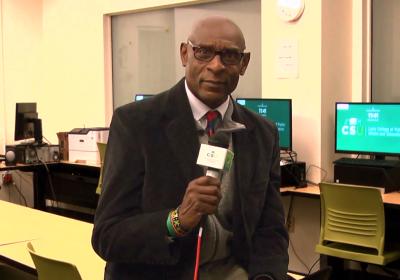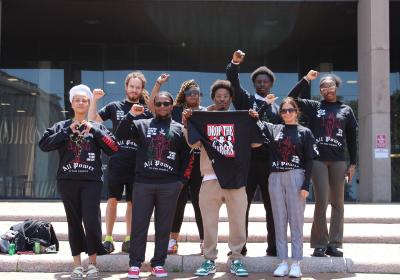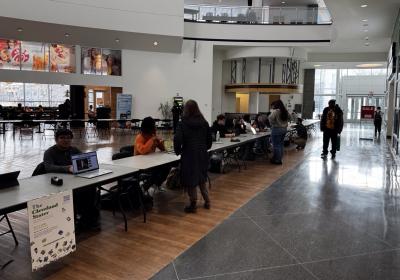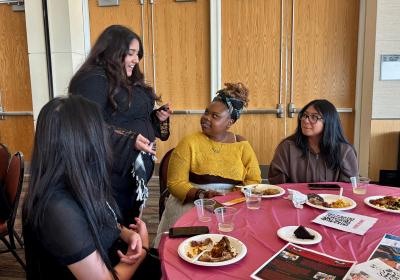
Do college students have a sports gambling problem?
Do college students have a sports gambling problem?
"I've lost over $300 this year just from sports betting," says Nia, a Cleveland State University student who is struggling to get by. "I don't have the money to keep wasting, but I have a feeling I’ll win soon."
Nia is one of three students who shared their experience of sports gambling and the effects it has had on them. She is also one of the more than 12 million U.S. college students betting on sports, according to the NCAA.
In a report released last year, the NCAA found that sports wagering was "widespread on college campuses." It said 67% of students living on campus were bettors and tended to bet at a higher frequency than other demographics. 41% of college students who bet on sports had placed a bet on their school's teams and 35% had used a student bookmaker.
According to the Addiction Center, college students in particular are at a higher risk for developing sports betting or gambling addictions. From high college tuition costs to fitting the bill for food throughout the week, many college students have hefty costs to cover and most of them do not have jobs. And it is not only college students.
Kayla is a graduating high school student. She is 18 years old and committed to attending Cleveland State.
“I have FanDuel downloaded on my phone right now,” Kayla said, opening the sports betting app. “My dad won $500 from betting, I downloaded the app as soon as I found out.”
Sports gambling is a legal activity that requires participants to be 21 years or older. However, studies from the National Council on Problem Gambling showed that even though you are required to be 21 years old or older, people much younger than this already have sports gambling apps downloaded on their phones.
Outside influences are a quick way for someone who hasn't started sports betting to get easily sucked into the world of sports betting.
In Kayla’s case, her parents have been an influence on her interest in sports betting. Other cases stem from sources like social media such as X (formerly Twitter), and heavy advertising, often featuring professional or retired athletes, during sports on TV and cable.
X, for example, has been incorporating online gambling statistics into its platform. MGM sports and BetMGM has partnered with X to bring sports gambling to the social media platform. According to Redwood Bark, social media is a major way that sports gambling is gaining popularity, especially among younger people.
Experts fear the psychological, physical and social impact of sports gambling, playing out in attendance problems, failing grades and added financial woes.
“I spent an extra semester at CSU and thought some parlays would bring down my financial debt,” said Deonna, who added over $500 to her financial problems with bets that went the wrong way.
Nia, Kayla and Deonna all lost money betting on sports. But the impact of gambling on youth seems unlikely to deter a huge and growing industry.
The business of gambling
Sports gambling in the U.S. is expanding. As of September 2024, 38 U.S. states, including Ohio, had legalized some form of sports betting. Revenue has increased almost 30 fold in the past five years, from $400 million in 2018 to $11 billion in 2023. In 2023 alone, Americans wagered $120 billion on sports.
Sports gambling is sold as a way for people to make fast money. Along with the dubious prospect of making money fast, it's easy, accessible and simple to make a bet. Algamus.org explains how multiple platforms including FanDuel, ESPN BET, and DraftKings are the main apps people are using to make their bets.
However, a study from July 2024, shows that 96% percent of online gamblers lose money, which is "by design." Analysis indicates that for every dollar the typical person bets on sports, they lose 7.7 cents — and, of course, the more they bet, the more they lose.
What can be done?
According to Redwood Bark, sports gambling is becoming a worldwide behavioral addiction affecting a growing number of people, mostly young adults aged 18-24.
If you or someone you love is struggling with sports gambling, help is available. Mental health professionals can help individuals understand the underlying conditions or events that may have led to the sports betting addiction.
Resources including The National Gambling Hotline and community groups are available to individuals who believe they may be at risk for serious addiction.
If you are at CSU and believe you or someone close to you needs help to deal with sports gambling or a gambling-related issue, please reach out to CARE, including by email magnusacts@csuohio.edu or call 216.687.2048.














